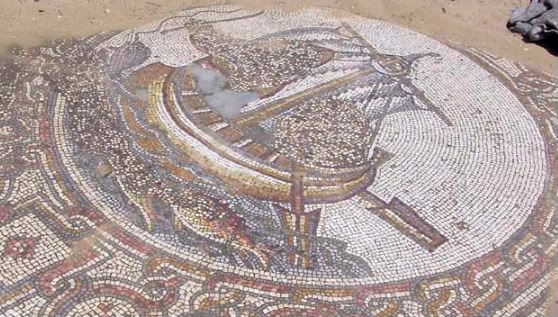
Guy Gavriel Kay has been a favourite author of mine since my mid-teens, when I lucked into a copy of his Fionavar Tapestry at my school's library. His eye for detail, even as he is creating worlds, adds depth and realism to his fantastical histories: this is an author who loves to research and create parallels to real events.
Sailing to Sarantium is the story of a craftsman, Caius Crispin, a mosaicist of skill, with a puzzle-solving and rather open mind. The Emperor in Sarantium is in need of skilled men to build and decorate for him a structure for their god, to replace one that was destroyed in an uprising a few years before. The book is mostly the story of Crispin's journey, with specific encounters that provide insight into his character and approach to the world. It touches on aspects of the history of our own Byzantine Empire, and the various philosophies, sects and schisms of the early Christian church. Crispin's Emperor shares characteristics with the historical Emperor Justinian, who had the Hagia Sophia built after its predecessor was destroyed in riots. The plague that took Crispin's family echoes the outbreak of the bubonic plague midway through Justinian's reign.
Throughout his fantasies, and using that unique quasi-historical perspective, Kay gives insight into aspects of life that affect his modern audience: mob mentality for one memorable example, or how small events in a life can shape it for years. Kay's writing doesn't pose questions and give pat answers: it's meaty and rich and feeds the thinker, with both larger theological issues, like whether one man's experience of god diminishes those of other men; and smaller more personal ones, like how one copes with grief or a loss of innocence.
In Crispin's world, “sailing to Sarantium” means taking a big step on a bigger journey, the making of a life change. Reluctant at first, he commits with intensity to the changes, once he sees that he has really no choice but to go. His journey, not much of it by actual ship, takes him through two soul-shaking encounters – with the old “pagan” ways of the tribal forest folk, who make blood sacrifices to their forest-dwelling, animal bodied deity, and with the roots of his own religion of the sun-god, Jad, though a mosaic in an old shrine.
I am very fond of stories about ordinary but extraordinary individuals: warrior kings and mastermind evil geniuses are all well enough, but both Bilbo and Frodo were simple folk, and the tales that allow simple folk to be heroes are the most accessible, I find. Crispin is not so much a simple man: he's layered with complexities of thought and his past haunts him, but he is a labourer who happens to love and be very good at his craft. I know many people much like him, and admire them as well.
Kay's earlier work, the Fionavar Tapestry touched on the universality of certain myths, and how echoes can be found across many cultures: he did so by making the origin of those myths (and the final resolution to several great tragedies within them) one source world, much as Amber is the source of the shadow-worlds that spin from it in Zelazny's celebrated series, the Chronicles of Amber. In Kay's works, that source world is known as Fionavar.
It's very interesting to me that his first work was about Fionavar, and all his subsequent books make fleeting reference to this legend/heretical philosophy. Even as the Fionavar series introduced the readers to the philosophy of multiple universes and certain theological conundrums therein, each subsequent work has a different theology, religion or philosophy as a recurrent theme. Kay doesn't use the religious ideas thus displayed as a bludgeon of his own beliefs, (indeed, with the varied perspectives of his characters, his own beliefs are anyone's guess), more as a incisive look into our own culture's religious history. The comparisons are less with the historical people or the events of the time, than with the theologies and flavour of those contemporary tensions.
One great grace of Kay's characters is that they never feel too modern. At no point does he snap the reader out of the atmosphere of the time, with overly modern language, attitudes or responses. Even his inventive cursing rings true to the setting and timeframe.
In Sailing to Sarantium, schisms within one belief are highlighted. Eastern and Western philosophies have collided, and through Imperial intervention, come to an uneasy truce. Our craftsman hero is brought to a cosmopolitan and unutterably subtle court, ruled by an ambitious and ruthless workaholic Emperor and his equally ruthless and inspiring Empress. Heathens from the desert threaten in the east, the once-civilized southern states are fractious under the new rulers, and in the West barbarian tribes have only just been conquered. Crispin's story, his companions, and the story of the Empire itself are laid like a tiles in a mosaic into this rich and historically fascinating setting. I am greatly anticipating diving into Book II, Lord of Emperors.
No comments:
Post a Comment